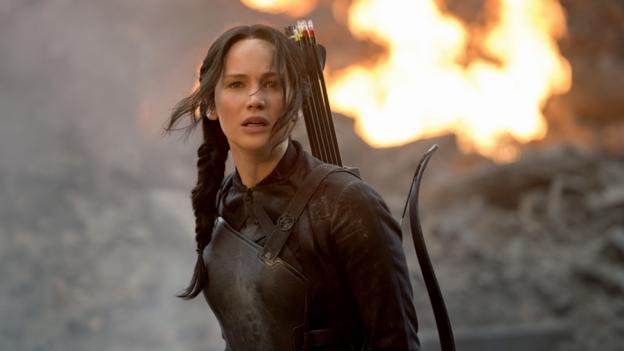Review: New Hunger Games film is not for ‘real adults’

(Lionsgate)
Jennifer Lawrence leads a revolution in the third Hunger Games movie. But can a YA novel yield a worthwhile film? Critic Owen Gleiberman delivers his verdict.
Early in The Hunger Games: Mockingjay – Part I, Katniss Everdeen (Jennifer Lawrence), nestled 50 storeys underground in a top-secret rebel command station, is summoned to a strategy meeting. Alma Coin (Julianne Moore), the high-handed leader of the rebellion, and Plutarch (Philip Seymour Hoffman), the movement's jaunty minister of propaganda, explain that the proletarian revolt that Katniss ignited now has the chance to take wing. If she can find it within herself to become the icon of revolution known as ‘The Mockingjay’, then the oppressed districts of the dystopian nation Panem will rise up, join forces, and break the fascist grip of the Capitol. Faced with this offer, Katniss seems neither pleased nor particularly incendiary. Instead, with a look of glazed yearning, she wants to know just one thing: "What about Peeta? Is he alive?"
This moment has an unmistakably kitschy ring to it, and it speaks to the quintessence of young-adult fiction and why no real adult should take it seriously (though more than ever, they do). Civilisation hangs in the balance, but what's really at stake is Katniss' feelings for Peeta – the dewiest of junior love stories. Of course you could argue that Casablanca, minus the puppy-love factor, works in pretty much the same way, with the outcome of World War II hinged on the issue of whether Humphrey Bogart's Rick will remain with Ingrid Bergman's Ilsa. But if Katniss is the forceful prime mover in Mockingjay – Part I, Peeta, let's be clear, is no Ilsa. As played by Josh Hutcherson, he has all the charisma of the least interesting member of the Yale crew team. Katniss, for most of Mockingjay – Part I, is more interested in saving this preppy hand-puppet than she is in bringing about the overthrow of tyranny. By now, even much of the audience may not share Katniss' Peeta fixation. Three movies into the Hunger Games series, their bond comes off as more desperately theoretical than ever.
Lawrence, who had the implacability of an Olympian in the first two Hunger Games films, now plunges Katniss into a mood of Hamlet-esque doubt: having become the poster girl for revolution, she's not at all sure if she wants the role. She's wary and woeful, just like the Katniss who first volunteered for the Hunger Games to save her sister. Lawrence has a chance to show some more vulnerability, but Katniss' tearful ambivalence about whether she's committed to the cause, or merely to saving Peeta, plays out in a less than scintillating way. It's not the actor’s fault. This is what happens when you split the third installment of a YA series into two blockbuster movies: Part I is basically all dragging exposition.
Games, must we?
When Katniss shot an arrow at the end of the previous film and shattered the forcefield covering the Capitol’s barbaric children-killing-children contest, she did more than bring down the Hunger Games. She effectively eliminated the premise of reality TV as a death match – and the critique of it – that had been the liveliest element in this series so far. The closest thing that Mockingjay – Part I comes up with to replace it is a televised war of propaganda. Plutarch, played by the late Hoffman with a sly-dog cynicism that makes you realise how much you'll miss him even in a franchise movie like this one, produces a series of propaganda videos, or 'propos'. They feature Katniss in her black-latex archer suit (so fetchingly colour-coordinated with her dark tresses) making revolutionary speeches to camera. At first, her words sound stilted and fake, but then Plutarch sends Katniss and a team of young cohorts to survey the smoking ruins of her home. Suddenly, her outrage is real. She's on fire again.
The Capitol’s wily President Snow (Donald Sutherland) comes up with a PR weapon of his own: it's the captured Peeta, interviewed, as if on some nightly chat show, by Stanley Tucci's unctuous, high-haired host. Peeta has been set up to preach to the Capitol’s subjects against Katniss, and that makes it obvious to us he's been drugged, or brainwashed, or something. His fate probably shouldn't amount to a hill of beans, but Katniss is fixated. And President Coin, who knows she needs Katniss to lead the revolution, agrees to her demand: that the rebels go in and rescue him.
Directed by Francis Lawrence (who made the franchise’s previous film, Catching Fire, as well as the upcoming Mockingjay sequel), Part 1 has gravity and sweep, with grandly sombre visual motifs lifted out of films from Metropolis to the original Star Wars. There are also some gripping scenes of impending battle. The destruction of a dam by rebel explosives gives a little rush of triumph: the revolution has begun! Yet for anyone who's not emotionally immersed in Suzanne Collins' book trilogy to begin with, your ultimate reaction may still be: why should I care? Sutherland continues to make President Snow a compelling despot with a Machiavellian twinkle in his eye, but in a funny way you like him more than you do the good guys. Lawrence, as a director, hasn't figured out how to turn the ragtag masses of Panem into anything more than a sodden tableau of oppression. And why does Moore play the leader of the revolt like Eva Peron with a touch of Pol Pot? She doesn't exactly inspire sympathy for the cause. Of course, I sound like I'm missing the point: it's all about Peeta! I just wish that wasn't the point.
★★☆☆☆
No comments:
Post a Comment